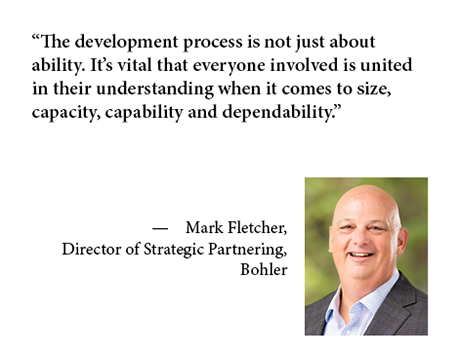When it comes to commercial real estate development, thoughtfully curated teams are critical to success.
“It’s important that the extended team works well with each other, so they can deliver results for clients,” explains Mark Fletcher, director of Strategic Partnering at Bohler, a land development design and consulting firm.
Developers don’t want to work with a variety of disjointed processes and personalities. They want to work with one team, a multi-discipline team that effectively manages time and resources, focusing on streamlined processes and speed to market. This sort of team unity promotes both cohesiveness and consistency in outcomes.
Building a great design and consulting team means having the property developer’s end goals in mind from the very start of the process: dependability, speed to market and turnkey solutions. The importance of fostering cohesion extends to finding an architect to optimize the building and a contractor to strategize materials and phasing. It may be necessary to engage an attorney who can work well with the team to address land use and zoning. Finally, the right site design and consulting firm can streamline communications, maintain timelines and entitlements and keep the project moving forward.
Here’s how Bohler’s approach to assembling a team can ensure a developer’s goals and values are baked into the planning, design and development process from the start. Real estate developers must consider culture, capabilities, quality, shared values and consistency when selecting development and construction partners.
1. Culture: Shared Values
“Culture is critical,” Fletcher says. “Relationships, teamwork, accountability, tenacity, a mindset that everyone on the team is valuable — these things ensure higher quality projects.”
Projects can be scaled and skills applied across a variety of types of projects and locations. No matter what project, Fletcher says, the same level of “quality of work, attention, focus on process” needs to be brought to each assignment.
Fletcher also indicates that firms with aligned culture, that value and prioritize the same principles, will see a cascade effect of positive professional investment in projects and a focus on simplifying and improving the development process. These “matching” company value systems will be more successful at working together, resulting in more successful projects over time.
2. Communication: Understanding the Scope of a Project and the Capacity of the Development Team
Capability is meaningless if a team cannot translate its abilities into something valuable and clear for the client.
Success requires “a lot of upfront interaction with key decision makers,” Fletcher explains. “The development process is not just about ability. It’s vital that everyone involved is united in their understanding when it comes to size, capacity, capability and dependability.”
Involving the entire design and construction team in these discussions early on means that all subconsultants are aligned and working as an integrated team right from the start. This creates an opportunity for all members to collaborate and identify the best way to design and develop the project based on what the real estate developer’s goals and priorities are.
3. Forward Thinking: Keeping Up with Trends and Best Practices
In a company culture that requires development employees to know about environmental, process and entitlement headwinds, as well as likely impacts, constant adapting to account for best practices is crucial. Developers need experts on their team who know the industry well and are able to adjust quickly, resulting in less time lost.
“By staying in tune with the development community and the challenges the clients are facing, you can adapt quickly and instill peace of mind. You can help the owner or the developer proactively address and overcome obstacles in the best way possible,” says Fletcher.
Understanding the full breadth of these projects is essential, Fletcher adds. “Our experienced leaders, our designers, our land development specialists know the process, not just civil concerns. They understand construction, materials and lead time.”
“We provide full-site civil design land consulting,” says Fletcher. “We don’t lay a brick. We don’t put up a stud. We don’t put on a roof. However, we understand how it happens and the importance of creating plans that contractors can build off of.”
Another aspect of making the most of trends and evolving regulations comes from cultivating good relationships with local jurisdictions and municipalities to facilitate projects, Fletcher notes. Developers should look for project partners who regularly work hand-in-hand with officials. Doing so enables Bohler to “let clients know what’s happening state by state or county by county — it’s important to know the local entitlement periods and permitting process.” This helps clients better understand timelines and creates stronger, more efficient relationships with those local officials, especially as permitting processes and due diligence methods evolve over time.
4. Efficiency: Focusing on Speed to Market
Time is money, so good real estate development teams bring projects to market as quickly as possible. A developer should rely on the team’s expertise to ensure that permitting snags, schedule extensions and reviews do not result in stalled projects.
The trick, Fletcher explains, is knowing what to do while you’re waiting. “It’s essential to know the process so well that you can continue to advance components while other parts are necessarily stalled.”
Streamlining is a critical part of the process at Bohler. Working with a team that’s both educated on process and organized means that developers can focus on their project without having to relay the same message ad nauseum.
Too many “moving parts” introduces the potential for something to go wrong for the client, Fletcher says. “A turn-key strategic teaming approach makes a team more competitive and able to deliver based on the expertise represented by the architect, general contractor, civil engineer, site contractor and structural engineer. Cohesiveness ensures they deliver a better product.”
— Bohler is a content partner of REBusinessOnline. For more articles from and news about Bohler, click here.


